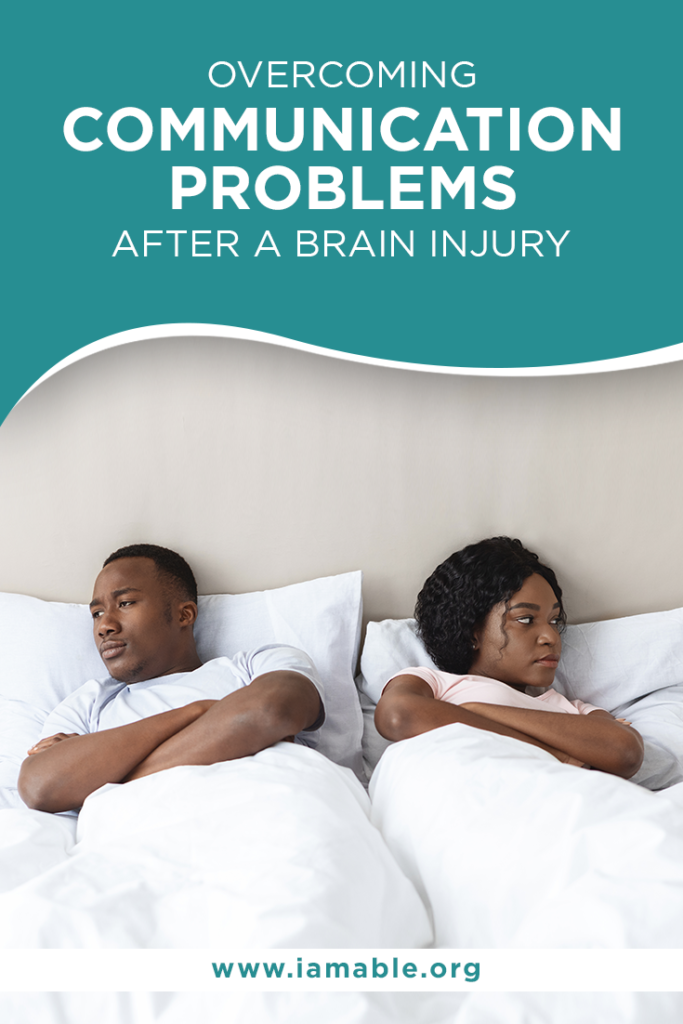Miami, FL 33186

Trouble communicating often occurs after a brain injury. Find out how you can overcome this common TBI problem in our discussion here at iAMABLE.org.
A traumatic brain injury doesn’t just affect a patient’s ability to move around or handle physical tasks. Instead, it can also impair one’s ability to communicate. Thousands of patients coming to a neuro rehab center in Miami struggle with this problem. Most of the time, it affects one’s ability to relate with people, go back to work, or express one’s feelings. But why does it happen? More importantly, how can you overcome communication challenges after surviving a brain injury?
When someone asks you for directions to a nearby shop, you consider several factors before you respond. For example, you might think of the person’s age to determine the language you will use and fine-tune the instructions.
You might also consider the person’s mode of transportation. Is he using a car or bicycle? Will he be walking to the location? Then, after getting the response, you have to look into other things like the person’s micro-expressions or emotions after hearing the directions you provide.
Your brain also controls your speech organs such as the lips, tongue, teeth, and mouth, allowing you to enunciate words. Your central nervous system also manages your body language, which accounts for 70 to 93 percent of the messages you communicate with people.
Unfortunately, when you suffer from a traumatic brain injury, many of these functions can get affected. Depending on the nature of your TBI, you might have difficulty in performing the following tasks:
Many of the people seeking help from our neuro rehab center in Miami experience these challenges. Some only observe a few of these issues, like trouble understanding the words they hear or struggling to respond to a question. However, others, especially those who experience paralysis in their facial muscles, find it virtually impossible to speak.
Each patient can have varying speech or communication difficulties, depending on the severity of the tissue damage and recovery rate. To give you an idea, here are some of the leading communication issues that patients with brain injuries often complain about:
It occurs when the muscles used for speech get affected by the injury. Most TBI patients with dysarthria have reduced movement of their tongue, lips, and soft palate. It also results in slowed or slurred speech and difficulty controlling the voice’s volume or tone.
When the frontal lobe suffers the impact, dyspraxia of speech usually follows. It results in challenges in understanding a long string of words and consciously analyzing what you say to people. Interventions like undergoing speech therapies or going to a neuro rehab center in Miami may play a role in improving your symptoms.
Aphasia, according to speech pathologists, is a language impairment that can affect a patient’s understanding of written or spoken language. Its effect can vary depending on the location of the injury inside the brain. Some patients may have receptive aphasia, which can cause difficulty in understanding language. Others, on the one hand, have expressive aphasia or difficulty in using language.
Someone diagnosed with apraxia of speech has a hard time saying what he wants. It primarily causes paralysis or weakness of the organs responsible for producing speech, such as your mouth, lips, and tongue.
Cognition and communication go hand in hand. And unfortunately, many patients with brain trauma – whether mild or severe – can experience cognition problems until the injury completely heals. Some of the cognitive functions that play a direct role in helping you communicate are as follows:
Which of the communication challenges of brain injury patients do you have? How long have you been experiencing such issues?
Often, patients note the gradual resolution of their speech and language issues after getting help from a neuro rehab center in Miami or other healthcare professionals. Other patients, on the other hand, seek speech therapists and practice techniques such as:
Exercises such as puckering your lips, stretching your tongue, and puffing your cheeks may help restore muscle movements. This can play a significant role in restoring your ability to say words correctly.
Tongue and lip articulation exercises aim to retrain your brain so it can coordinate the movement of speech-producing organs like the mouth. It focuses on activating and strengthening the speech muscles through slow, specific, and repetitive motions.
Coping with cognitive-communication disorders involves a combination of personalized strategies, including:
Besides scheduling a regular trip to a neuro rehab center in Miami and undergoing speech therapy, it would help to learn how to live with paralysis. By doing so, you can begin making adjustments to your life and transforming your mindset. This will help you transition better and manage your expectations with your current condition.
To help you do that, we at iAMABLE.org created a short guide on living with paralysis. It’s an eBook containing the seven fundamental steps that can help TBI survivors cope better.
Download our special eBook on thriving after a paralyzing injury today and discover a transformative approach to embracing your new life.
Grab our free e-book 7 Unbelievably Important Steps to Take to THRIVE after Paralysis by clicking the image below.
